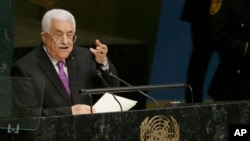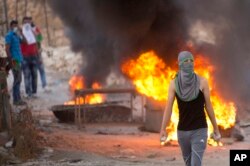Palestinian leader Mahmoud Abbas told the United Nations Wednesday that Palestine is no longer bound by its two-decade-old Oslo peace agreements with Israel, calling on the world body to provide international protection for Palestinians.
He accused the Jewish state of refusing to release Palestinian prisoners while creating new Israeli settlements in the West Bank and East Jerusalem. It was his most pointed warning yet that he might end engagement with Israel, but he said nothing about coordination between Palestinian security forces and Israeli troops in the West Bank against their shared enemy, the Islamic militant group Hamas.
The Abbas speech drew an immediate rebuke from Israeli Prime Minister Benjamin Netanyahu. The Israeli leader said it was "deceitful and encourages incitement and destruction in the Middle East."
Netanyahu called on the Palestinian leader to "act responsibly" and engage in peace talks without preconditions.
‘An occupying force’
Abbas told the U.N. that Palestinians could not continue to honor the 1993 peace accord and "Israel must assume fully all its responsibilities as an occupying force."
Abbas told the U.N. General Assembly that Palestine deserves full membership at the U.N. and recognition as a state.
The Palestinian leader made his demands ahead of a ceremony to raise the black, white, green and red Palestinian flag at the world body’s headquarters for the first time, placing it alongside those of the U.N.'s 193 member states.
He called on "those countries that have not recognized the state of Palestine yet, to do so."
The Palestinian president had promised a “bombshell” announcement in advance of his U.N. appearance.
But analysts questioned whether his speech will have much impact at a time when the Middle East peace process is far down the international community's agenda.
“Mahmoud Abbas has a major strategic dilemma on his hands,” said Josef Olmert, Israeli political insider and adjunct professor of political science at the University of South Carolina, “and that is how to make the Palestinian question in general, and the Palestinian Authority in particular, relevant again, at a time when the burning issues in the Middle East are Syria, Iraq, refugees and ISIS,” Olmert said, using one of the acronyms for the Islamic State.
‘Nothing but symbolism’
Nor are some on the Palestinian side holding out much hope that anything Abbas said could breathe life back into the obsolescent peace process.
“I think it will be just like what we have seen in the past - attempts to create excitement and enthusiasm around speeches that end up being nothing but symbolism,” said Yousef Munayyer, executive director of the U.S. Campaign to End the Israeli Occupation.
The Palestinian leader had said only that his speech would focus on the 1993 Oslo accords and what he calls Israeli violations of the agreements, like settlements and the demolition of Palestinian buildings. He has warned that a recent escalation in conflict could lead to another intifada.
In an editorial in the Huffington Post Tuesday, Abbas wrote, “It is time to finally achieve the independence of the State of Palestine, peacefully resolving the Palestinian-Israeli conflict - the core of the Arab-Israeli conflict - as was promised long ago.”
A recent poll conducted by the Palestinian Center for Policy and Survey Research showed that 51 percent of Palestinians oppose the two-state solution of Israel and Palestine. But it is unlikely Israelis would accept a one-state solution because it would not have a Jewish majority and would negate the theological concept of a Jewish homeland.
“A one-state solution as envisaged by the Palestinians will not be,” said Olmert. “Israel is a one state, the nation state of the Jewish people.”
Uptick in violence
Clashes in recent weeks have centered on a site in Jerusalem sacred to both Muslims and Jews: Muslims call it Haram al-Sharif, or the Noble Sanctuary; Jews know it as Har Habayit, or the Temple Mount.
“After Israel captured East Jerusalem in 1967, there has been a status quo whereby Jews may visit the Temple Mount, but they are not allowed to worship there,” said Ron Kampeas, Washington bureau chief of the Jewish Telegraph Agency.
Jews and Christians are permitted to enter the compound between 7:30 a.m. and 11:30 a.m. but may not pray.
“But today, fewer and fewer people abide by that, and there’s a greater eagerness among Israel’s nationalist religious camp to go up to the Temple Mount,” he said. “And the response of other sectors, including individuals within [Israeli Prime Minister Benjamin] Netanyahu’s ruling coalition, has been, ‘Why shouldn’t Jews be able to worship on the Temple Mount, as long as they don’t force Muslims out?’”
Tough new laws
The latest violence broke out just prior to the Jewish New Year, Rosh Hashanah, which always brings more visitors to the compound. Muslim youths barricaded themselves inside the compound’s Al-Aqsa mosque - despite new restrictions that allowed only men over the age 50 to enter the complex - throwing rocks and firebombs at Israeli police.
Tensions have also been exacerbated by Israel’s recent decision to toughen penalties on stone throwers. On September 16, Israel announced prison sentences of up to 20 years for anyone caught throwing rocks and penalties for parents of children who throw rocks and other objects at Israeli police.
Police have responded to such attacks with tear gas and rubber bullets.
Israel has also relaxed rules regarding the use of live fire by Israeli police and soldiers. Under the new policy, security forces will be able to fire .22 caliber rifles in situations in which they deem they are - or anyone else is - in danger.
“Any time you loosen up on fire rules, you increase the possibility that there will be casualties, and anytime casualties increase, you create the opportunity for extremists to exploit that and to further flame the situation,” Ron Kampeas said. “So Netanyahu is walking a very fine line over there.”
In a September 15 briefing before the U.N. Security Council, Nickolay Mladenov, United Nations Special Coordinator for the Middle East Peace Process, expressed concern over continuing Israeli settlement expansion and demolition of Palestinian structures in the West Bank and East Jerusalem.
Five days earlier, the U.N. voted in favor of raising the Palestinian flag at its New York headquarters in support of Palestinian aspirations for independence.












